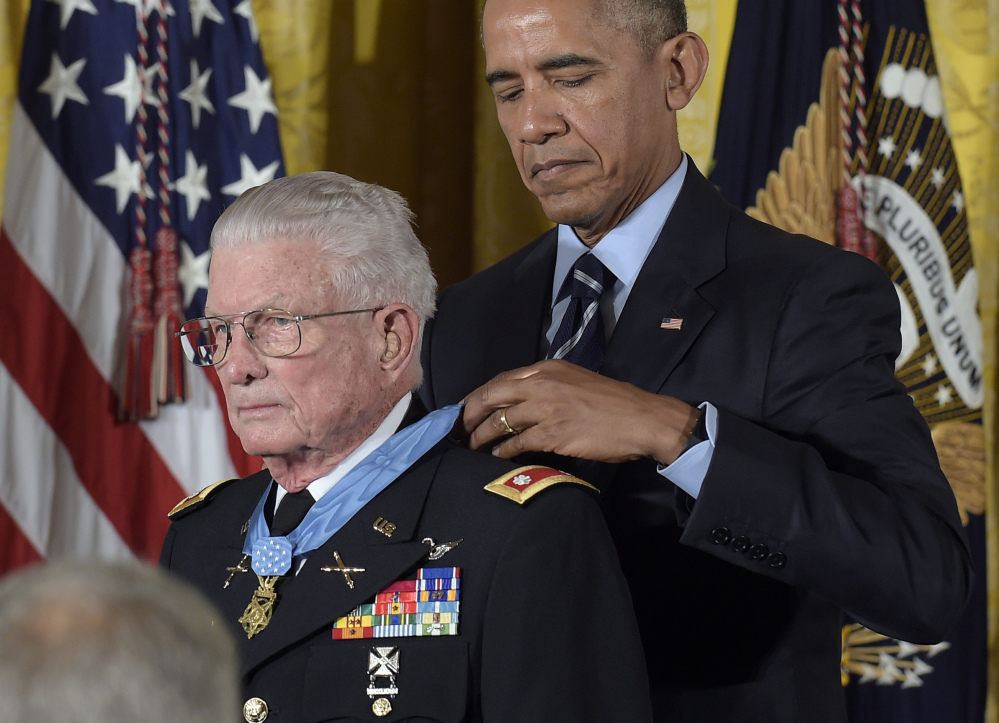It was a dire situation: Eight U.S. soldiers with the 101st Airborne Division had been left on a Vietnam battlefield after not reaching helicopters in time for an emergency extraction from a gun-swept river valley. Enemy fighters were closing in, and the soldiers would almost certainly be taken prisoner or killed in the next few minutes.
Army helicopter pilot Charles Kettles, now 86, learned of their predicament through a radio transmission moments after lifting other soldiers out of the firestorm. He’d already made three trips into the melee below, but made a snap judgment: There wasn’t enough time to return to a base nearby for reinforcements, so he broke away from his formation of aircraft and went back to retrieve the soldiers.
That decision and Kettles’s ensuing actions led to President Obama on Monday awarding him the Medal of Honor, the nation’s highest award for valor in combat. The graying grandfather sat in a chair in the East Room of the White House paying close attention as the president recounted with amazement his actions on May 15, 1967.
“Couldn’t make this up,” Obama exclaimed at one point while describing the rescue effort, drawing laughter. “This is like a bad ‘Rambo’ movie. … You’re listening to this; you can’t believe it.”
Kettles, then a major, maneuvered his UH-1 Huey into a hail of enemy fire as he made his fourth trip of the day into the valley. He landed hard enough that the helicopter bounced for several hundred feet before coming to a stop, and moments later a mortar round shattered the aircraft’s windshield, Obama recalled.
The eight soldiers nonetheless sprinted for the Huey and piled aboard. With 13 people on board, the aircraft was 600 pounds overweight, but Kettles improvised and bounced it across the ground until it picked up enough speed to take off, Obama said.
The helicopter was hit in the tail moments later by another mortar, but Kettles piloted them to safety anyway. The ride was so rough that one soldier fell out of the helicopter, and clung to a skid beneath to stay alive. In total, Kettles was credited with saving the lives of 44 soldiers that day.
Kettles, of Ypsilanti, Mich., was awarded a Distinguished Service Cross, the Army’s second-highest award for valor, after the battle. But the retired lieutenant colonel’s case for the highest military award was jump-started by William Vollano, a Rotary Club volunteer who interviewed Kettles for a project that recorded the oral histories of veterans.
Obama credited Vollano on Monday with embarking on a five-year mission along with Kettles’ son, Mike, to get the Army pilot greater recognition. Army officials and Defense Secretary Ashton Carter eventually recommended the upgrade, and Congress passed legislation that waived an Army restriction that says that a Medal of Honor recommendation must be made within two years.
Kettles’s story demonstrates the belief, Obama said, that nobody should be left behind.
Copy the Story LinkSend questions/comments to the editors.



Success. Please wait for the page to reload. If the page does not reload within 5 seconds, please refresh the page.
Enter your email and password to access comments.
Hi, to comment on stories you must . This profile is in addition to your subscription and website login.
Already have a commenting profile? .
Invalid username/password.
Please check your email to confirm and complete your registration.
Only subscribers are eligible to post comments. Please subscribe or login first for digital access. Here’s why.
Use the form below to reset your password. When you've submitted your account email, we will send an email with a reset code.